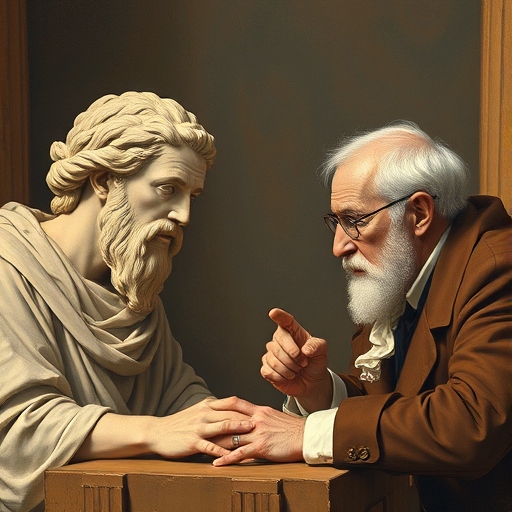Category: Philosophy
-
Debate! Heidegger vs Putnam
The Role of Language in Shaping Our Understanding of the World and the Nature of Meaning Moderator: Welcome, esteemed philosophers. Today, we discuss the role of language in shaping our understanding of the world and the nature of meaning. Martin Heidegger, let’s begin with your views. Martin Heidegger: Language is the house of Being. It…
-

Philosophers Debate! Round 1!
Five debates occur! Plato vs Foucault Wittgenstein vs Rawls Russell vs Aquinas de Beauvoir vs Friedrich Nietzsche Gould vs. Socrates Round 1: Plato vs. Foucault Setting: A timeless agora, where philosophers from all eras can convene. Moderator: Welcome, esteemed thinkers. Today, we witness a clash of titans: Plato, the Athenian philosopher of Forms, and Michel…
-
Philosophy: Marriage
The question of marriage’s relevance in contemporary society is far from simple, with a vast array of personal, philosophical, cultural, and legal factors influencing its perceived importance. Across the ages, marriage has been an institution deeply embedded in societal norms, yet today, its continued significance is fiercely debated. Whether marriage remains a vital structure or…
-
Philosophy: Reality as Binaries
This is surprisingly difficult to generate with language models.. We often think of life, and reality, as a vast continuum of choices, decisions, and consequences. But no matter the scale, everything ultimately distills into the binary: to be or not to be, to act or not to act, to choose or to refuse. Human evolution…
-
Philosophy: Centralization and Equilibrium
Centralization and decentralization are more than just organizational concepts; they are philosophical choices that shape how power, control, and autonomy are distributed within any system. From politics to business, technology to economics, these two approaches offer contrasting solutions to age-old questions about efficiency, freedom, and responsibility. Both models come with their own set of advantages…
-
Philosophy: On Pain
Pain, an experience universally recognized yet profoundly personal, is far more than a mere unpleasant sensation. It is a complex, multifaceted phenomenon that plays a crucial role in the survival, health, and well-being of living organisms. While often perceived as an enemy to be vanquished, pain serves as an indispensable warning system, a diagnostic tool,…
-
Philosophy: Dichotomies
General/Conceptual Dichotomies Related to Human Experience More Specific/Technical Dichotomies Social Dichotomies Economic Dichotomies Government Dichotomies Scientific Dichotomies Spiritual Dichotomies Medical Dichotomies Philosophical Dichotomies Political Dichotomies Legal/Justice Dichotomies Environmental Dichotomies Technological Dichotomies Artistic/Aesthetic Dichotomies Educational Dichotomies Treatise on Dichotomies Existence is a complex tapestry woven from the threads of countless dichotomies, each representing a dynamic interplay…
-
Philosophy: Contradictions in Existence
A Treatise on the Contradictory Nature of Existence: A Narrative Exploration Existence is not a linear progression but of complex dynamics of opposing forces. This inherent contradiction is not a flaw to be corrected, but rather a fundamental characteristic that imbues reality with its profound depth, dynamism, and vitality. This narrative journey will traverse the…
-
Philosophy: On Experts
The question “Why trust experts?” invites a profound exploration of knowledge, authority, and human fallibility, rooted in fundamental philosophical principles. In a world brimming with complexity, experts offer a guiding light, distilling vast and intricate information into accessible insights. Yet, this reliance on expertise also exposes us to the risks of bias, error, and manipulation.…
-
Philosophy: Is Life a Journey or Destination?
Is life a journey, a destination, or something else entirely? We stand at a fork in the road, one path promising a clear endpoint—a trophy, a title, a finish line—the other a twisting, unpredictable route. But what if neither is the true path? What if the very question is flawed? This isn’t a simple debate;…
-
Philosophy: What does it mean to know?
The concept of “knowing” is central to many fields, from philosophy to everyday life. There are multiple senses in which we use the verb “to know,” and this distinction has been the subject of much philosophical reflection. Let’s focus on the “knowledge of facts” (sense 1), a topic that has generated intense discussion since the…
-

Philosophy: Can art be objectively critiqued?
The Argument for Yes Despite the allure of the idea that beauty is purely subjective, there are some very solid reasons to believe that aesthetic judgments are not merely the result of personal whims or cultural trends but are grounded in real, objective truths. Art is not just an exercise in individual taste; it is…
-

Philosophy: Virtue, according to Nietzche
Friedrich Nietzsche’s approach to virtue contrasts sharply with that of many traditional philosophers, particularly those in the Aristotelian or Kantian traditions, who advocate for universal virtues that are suitable for all human beings regardless of context. Nietzsche’s view is more individualistic, rooted in his broader philosophy of perspectivism and will to power, which emphasizes the…
